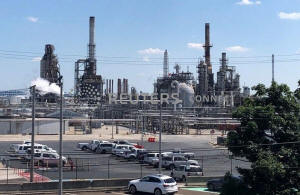PES up against the clock to sell Philadelphia refinery in cash crunch
 Send a link to a friend
Send a link to a friend
 [August 17, 2019] By
Laila Kearney [August 17, 2019] By
Laila Kearney
NEW YORK (Reuters) - Finding a buyer for
Philadelphia Energy Solutions' oil refinery has grown urgent as the
bankrupt company's funds dwindle and no signs emerge that it is winning
a fight for insurance payouts after a June blaze at the plant, according
to court documents and bankruptcy experts.
Without access to the more than $1 billion in insurance coverage,
selling the refinery has become one of the company's only options to
raise cash before being forced to liquidate.
At least three parties have potential proposals to buy the shut
Philadelphia refinery, each with plans to reopen the 1,300-acre
(5.3-square km) site with a mix of oil refining and alternative energy
production, sources familiar with the plans said.
Initial meetings are scheduled between the prospective buyers and a
collection of vetters over the next several weeks, but it is unclear how
long it would take for any official bid to come together, the sources
said.

PES was not available for comment on whether it had reviewed any of the
proposals or how viable it considered them to be.
For the second time in less than two years, PES filed for Chapter 11
bankruptcy on July 21, exactly a month after fire and blasts destroyed
an alkylation unit at the 335,000-barrel-per-day refinery.
PES shut its final crude unit in late July, and more than 600 workers
are in the process of being laid off without severance pay or the option
for continued health insurance.
The company has no prepackaged arrangement to restructure the business
or income from running the refinery, the largest in the U.S. Northeast,
raising the likelihood it will be forced to liquidate.
"They're playing a game against the clock," said Christina Simeone, a
senior fellow at the Kleinman Center for Energy Policy at the University
of Pennsylvania, who wrote a report last year predicting the refinery
would close by 2022 due to poor economics.
To emerge from bankruptcy, PES needs to tap into $1.25 billion in
property damage and loss of business insurance coverage, according to
court filings. So far, PES has been denied requests for payment, and at
least one creditor has surfaced to fight for any future insurance
proceeds. Seven others are objecting to PES' bankruptcy plan.

[to top of second column] |

The Philadelphia Energy Solutions oil refinery
is shown after a fire that caused significant damage to the complex,
in Philadelphia, Pennsylvania, U.S., June 26, 2019. REUTERS/Laila
Kearney/File Photo

It is unclear how much is left of the initial $65 million bankruptcy loan PES
secured at the start of the process, which is needed to pay for attorneys, wind
down the massive refinery complex, utility bills and salaries.
PES recently asked the court to retain law firm Kirkland and Ellis for $4.6
million and another firm for $1 million, according to court documents.
On Friday, the U.S. Trustee appointed to the bankruptcy case objected to
Kirkland and Ellis, saying the firm has represented PES's largest equity holders
in unrelated matters, creating a potential conflict of interest, court documents
show.
"Given the incident which precipitated the filing of this Chapter 11 proceeding,
there is a strong likelihood that the assets of the debtor will be liquidated
rather than reorganized," the trustee wrote in court documents.
PES hired investment bank PJT Partners about two weeks ago to market the site.
PJT declined to comment on its efforts to find a buyer.
Companies in Chapter 11 bankruptcies generally face two scenarios when
attempting to sell assets, said Eric Snyder, a bankruptcy expert and partner at
New York-based law firm Wilk Auslander, who is not working on PES' case.
With the luxury of time, companies can enter into an agreement with a single
bidder to be decided on by a bankruptcy court judge. Or, they can hold a bare
auction, opening up the sale to all qualified bidders for a set period of time.

If no deal comes together before the company runs out of money, it could be
forced to start Chapter 7 liquidation, Snyder said. Chapter 11 is a generally
better outcome for creditors, as assets tend to fall in value during
liquidation, which would leave them with less chance to collect on what they are
owed.
"It's in the creditors' best interest to try to make it through Chapter 11, but
for people interested in the PES site for future uses, it's far better for it to
go to Chapter 7," the Kleinman Center's Simeone said.
(Reporting by Laila Kearney; Editing by Marguerita Choy and Tom Brown)
[© 2019 Thomson Reuters. All rights
reserved.] Copyright 2019 Reuters. All rights reserved. This material may not be published,
broadcast, rewritten or redistributed.
Thompson Reuters is solely responsible for this content. |